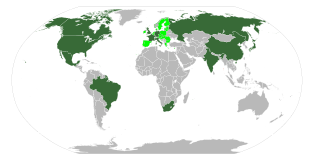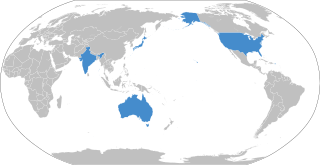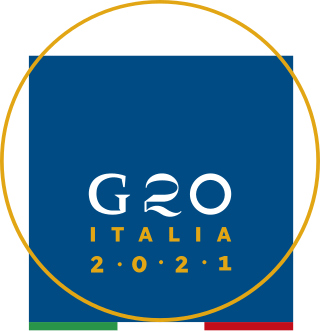
Asia-Pacific Economic Cooperation is an inter-governmental forum for 21 member economies in the Pacific Rim that promotes free trade throughout the Asia-Pacific region. Following the success of ASEAN's series of post-ministerial conferences launched in the mid-1980s, APEC started in 1989, in response to the growing interdependence of Asia-Pacific economies and the advent of regional trade blocs in other parts of the world; it aimed to establish new markets for agricultural products and raw materials beyond Europe. Headquartered in Singapore, APEC is recognized as one of the highest-level multilateral blocs and oldest forums in the Asia-Pacific region, and exerts significant global influence.

The Indo-Pacific is a vast biogeographic region of Earth.
The Atlantic Council is an American think tank in the field of international affairs, favoring Atlanticism, founded in 1961. It manages sixteen regional centers and functional programs related to international security and global economic prosperity. It is headquartered in Washington, D.C. It is a member of the Atlantic Treaty Association.

Shashi Tharoor is an Indian former international civil servant, diplomat, bureaucrat, politician, writer and public intellectual who has been serving as Member of Parliament for Thiruvananthapuram, Kerala, since 2009. He is the Chairman of the Standing Committee on Chemicals and Fertilizers. He was formerly an Under-Secretary-General of the United Nations and unsuccessfully ran for the post of Secretary-General in 2006. Founder-Chairman of All India Professionals Congress, he formerly served as Chairman of the Parliamentary Standing Committee on External Affairs and on Informational Technology.

The Group of Seven (G7) is an intergovernmental political forum consisting of Canada, France, Germany, Italy, Japan, the United Kingdom and the United States; additionally, the European Union (EU) is a "non-enumerated member". It is organized around shared values of pluralism, liberal democracy, and representative government. As of 2020, G7 members are large IMF advanced economies and account for over half of global net wealth, 30 to 43 percent of global gross domestic product, and 10 percent of the world's population. Its members maintain mutually close political, economic, diplomatic, and military relations in global affairs.

The G4 nations, comprising Brazil, Germany, India, and Japan, are four countries which support each other's bids for permanent seats on the United Nations Security Council. Unlike the G7, where the common denominator is the economy and long-term political motives, the G4's primary aim is the permanent member seats on the Security Council. Each of these four countries have figured among the elected non-permanent members of the council since the UN's establishment. Their economic and political influence has grown significantly in the last decades, reaching a scope comparable to the permanent members (P5). However, the G4's bids are often opposed by the Uniting for Consensus movement, and particularly their economic competitors or political rivals.

The G20 or Group of 20 is an intergovernmental forum comprising 19 countries and the European Union (EU). It works to address major issues related to the global economy, such as international financial stability, climate change mitigation and sustainable development.

Relations between India and the United States date back to India's independence movement and have continued well after independence from the United Kingdom in 1947. Currently, India and the United States enjoy close relations and have deepened collaboration on issues such as counterterrorism and countering Chinese influence in the Indo-Pacific.

The Group of Eight + Five (G8+5) was an international group that consisted of the leaders of the heads of government from the G8 nations, plus the heads of government of the five leading emerging economies. In March 2014, Russia was cast out of the Group of 8 due to its involvement in the 2014 Crimea crisis in Ukraine, so the G8+5 in its original form is unlikely to reconvene with Russia present.

The Act East policy is an effort by the government of India to cultivate extensive economic and strategic relations with the nations of Southeast Asia to bolster its standing as a regional power and a counterweight to the strategic influence of the People's Republic of China. Initiated in 1991, the Look East policy by Indian government marked a strategic shift in India’s perspective of the world. It was developed and enacted during the government of Prime Minister Narsimha Rao (1991–1996) and rigorously pursued by the successive administrations of Atal Bihari Vajpayee (1998–2004) and Manmohan Singh (2004–2014).

The Quadrilateral Security Dialogue (QSD), commonly known as the Quad, is a strategic security dialogue between Australia, India, Japan and the United States that is maintained by talks between member countries. The dialogue was initiated in 2007 by Japanese Prime Minister Shinzo Abe, with the support of Australian Prime Minister John Howard, Indian Prime Minister Manmohan Singh and U.S. Vice President Dick Cheney. The dialogue was paralleled by joint military exercises of an unprecedented scale, titled Exercise Malabar. The diplomatic and military arrangement was widely viewed as a response to increased Chinese economic and military power.
The foreign policy of the Modi government is associated with the policy initiatives made towards other states by the current government of India after Narendra Modi assumed the office of prime minister on May 26, 2014.

The most significant initiative made by the Narendra Modi government is the focus on neighbouring countries and major Asian powers coupled with emphasizing on the two decades old Look East policy. Asia being the major focus area of his foreign policy, Modi and his foreign minister chose several Asian countries for their initial bilateral visits. He has made state visits to Bhutan and Nepal and Japan within the first 100 days of his government and also hosted Asian leaders like former Prime Minister Tony Abbott of Australia, President Xi Jinping of China and Prime Minister Nguyễn Tấn Dũng of Vietnam, apart from inviting SAARC leaders in his inauguration ceremony. External Affairs Minister Sushma Swaraj has also made official visits to several Asian capitals like Dhaka, Bangladesh, Kathmandu, Nepal, Naypidaw, Myanmar, Singapore, Hanoi, Vietnam, Manama, Bahrain, Kabul, Afghanistan, Dushanbe, Tajikistan, Malé, Maldives, Abu Dhabi, United Arab Emirates, Seoul, South Korea and Beijing China.

The 2019 G20 Osaka summit was the fourteenth meeting of the G20, a forum of 19 countries and the EU that together represent most of the world economy. It was held on 28–29 June 2019 at the International Exhibition Center in Osaka. It was the first G20 summit to be hosted by Japan.

The 47th G7 summit was held from 11 to 13 June 2021 in Cornwall, England, during the United Kingdom's tenure of the presidency of the Group of Seven (G7), an inter-governmental political forum of seven advanced nations.

The 2021 G20 Rome summit was the sixteenth meeting of the Group of Twenty (G20), which was held in Rome, the capital city of Italy, on 30–31 October 2021.

The 2023 G20 New Delhi summit is the upcoming eighteenth meeting of G20, a summit scheduled to take place in Bharat Mandapam International Exhibition-Convention Centre (IECC), Pragati Maidan, New Delhi in 2023. It will be the first ever G20 summit to be held in India as well as in South Asia.


























